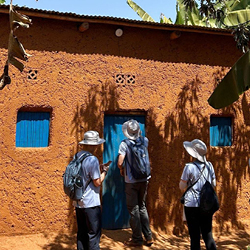International Collaborations with Impacts
Forging a global network of educational and research partners to bolster the University’s impact on both international and local challenges
A key element of internationalisation involves establishing partnerships with global entities in education and research to create meaningful societal contributions. For years, PolyU has actively engaged with businesses and academic institutions worldwide, aiming not only to pave the way for its students’ development, but also to harness its expertise for the benefit of a better world.
Boosting Research Impacts
To leverage research expertise for tackling both global and local challenges, PolyU is building collaborations with numerous international and Mainland organisations and enterprises.
One such collaboration with the China Academy of Space Technology led to the creation of a series of space instruments, which have played a pivotal role in China’s space exploration missions, including to the Moon and to Mars.
Meanwhile, its joint research endeavours with HOYA Vision Care and ZEISS Vision Care have resulted in ground-breaking lenses designed to effectively slow the progression of myopia in children. This innovation is particularly crucial, as projections suggest that by 2050, myopia could affect half of the global population, underscoring the urgent need for solutions.
Moreover, PolyU’s collaborative spirit has been instrumental in establishing three world-class research centres at the Hong Kong Science Park, as part of the government-funded InnoHK initiative. In collaboration with the Royal College of Art, the U.K., PolyU established the AiDLab to integrate innovative AI technologies into design to address society’s needs for creativity, efficiency and customisation of products and services.
In collaboration with the University of Maryland (UMD), PolyU initiated the Centre for Advances in Reliability and Safety to develop new approaches using AI methodologies to ensure the reliability and safety of products and systems used in a broad range of advanced manufacturing applications.
Jointly with Canada’s University of Waterloo (UW), PolyU founded the Centre for Eye and Vision Research (CEVR), the world’s first international hub for vision science to promote eye health with clinical, basic and applied research and to develop groundbreaking technologies to prevent vision loss and preserve sight among the ageing population.

PolyU formed partnership with the University of Waterloo in education as well as research.
In 2024, PolyU further collaborated with UW’s Waterloo Institute for Nanotechnology, Canada’s largest nanotechnology institute, to establish the Research Centre for Nanoscience and Nanotechnology. This Centre serves as a unique research platform that harnesses international research expertise to develop novel approaches and technologies in nanoscience for diverse applications, ultimately enhancing human life.
Making changes with collaborations in education
PolyU is also building a robust international network in education. One recent initiative is the Dual PhD Degree Programmes in collaboration with more than 20 overseas and Mainland universities, including Queensland University of Technology, Korea University, University of Surrey, and Zhejiang University. Furthermore, the School of Hotel and Tourism Management has recently signed agreements with Institut Lyfe in France, as well as University of Ljubljana and University of Primorska in Slovenia, on cooperation in research and education.
For student exchange, the University has formed a strong network of partnerships covering more than 80 universities spanning 25 countries. Meanwhile, its overseas Work- Integrated Education (WIE) supporters include the Shanghai Silk Group in Mainland China, edison.ai in Japan, Rider Levett Bucknall Limited in New Zealand, Mitacs in Canada, and Cathay Pacific Airways in Thailand, among many others. Both initiatives foster students’ non-local learning experience for the development of a globalised perspective that is much needed in today’s inter-connected world.
In a journey marked by dedication and global support, PolyU has pioneered the integration of social responsibility and civic engagement into its undergraduate curriculum, becoming the first local university to do so. Since 2012, this visionary approach has inspired over 42,400 students to embark on Service-Learning (SL) adventures, collectively contributing more than 1.69 million hours of service. These students have touched lives and communities not only in Hong Kong, Mainland China, and Taiwan, but also internationally, such as in Asia (Cambodia, Vietnam, Myanmar, Indonesia, Thailand, and Japan) and further abroad (Rwanda, South Africa, and Tanzania).
Take SL in Rwanda as an example. PolyU has built up a programme dedicated to social responsibility education since 2013, with student teams contributing their classroomlearned knowledge and skills to address multifaceted community challenges. The programme has a dual impact on the local community. Over 1,000 households have been provided with clean electricity, energy-efficient cooking stoves, kitchen gardens for nutrition. Furthermore, local tailors have been empowered to improve their livelihood through the integration of modern fashion. This programme was recognised with a QS Reimagine Education Award in the Sustainability Education Action category.



In a Service-Learning project held in Rwanda, PolyU students help install solar panels to generate electricity for rural households.
Mainland and beyond
Supporting the development of Mainland China not only contributes to improving the well-being of the people, but also integrates Hong Kong into the technological and scientific advancement of the Nation. PolyU’s collaborative network in Mainland China is extensive as well as extended over time. In 1997, PolyU became the first university from Hong Kong approved by the Ministry of Education for cross-border collaboration in offering a higher education programme in the Mainland.
In a recent strategic initiative, the University has started to set up a series of Mainland Translational Research Institutes (MTRIs) in selected cities to align PolyU’s research capacities and outcomes with local industrial and societal needs, enhancing the impact of its research and strengthening the socioeconomic development of those cities and the Nation.
In weaving a rich tapestry of international connections, PolyU has set its sights on the Belt and Road (B&R) countries, aligning with the Nation’s initiatives to spur regional development. With a determined spirit, PolyU seeks to cultivate academic exchanges, research collaborations, and partnerships with institutions across the B&R regions.
The University co-founded the University Alliance of the Silk Road with the Xi’an Jiaotong University in 2015 and was appointed its Rotating President in 2023. The Alliance brings together over 150 universities from 37 countries and regions to promote higher education collaborations and exchanges in the Silk Road region. In 2024, a Presidents’ Forum was held at PolyU, fostering the exchange of insights in support of the B&R Initiative.
It has also joined other B&R alliances to build robust partnerships with institutions worldwide and to increase the impact of its education, research and knowledge transfer activities. They include:
Association of Sino-Russian Technical Universities
Alliance of International Science Organisations for the Belt and Road Regions
The China-Pakistan Economic Corridor Consortium of Universities
University Consortium of the 21st Century Maritime Silk Road
ASEAN-China Network for Cooperation and Exchanges among Engineering and Technology Universities
For the seventh consecutive year, PolyU joined forces with Xi’an Jiaotong University, the State Grid Corporation of China and The Hongkong Electric Company, Limited to host the “Belt and Road Advanced Programme in Power and Energy”. Themed “Low Carbon Transition: Latest Development of Green Energy”, the latest programme attracted 26 participants from seven B&R countries and regions, including Chile, Mainland China, Hong Kong, the Philippines, Portugal, Russia, and Zimbabwe, all coming together to explore advancements in green energy.

Participants from seven Belt and Road countries and regions joined the Graduation Ceremony of the “Belt and Road Advanced Programme in Power and Energy 2024”.
Taking the lead in international collaborations
PolyU also played a pivotal role in co-founding two other international networks. In 2015, it spearheaded the creation of the University Social Responsibility Network (USRN), a global alliance promoting social responsibility as a core mission of universities. Today, USRN boasts 21 member institutions spanning six continents, with PolyU proudly serving as the chair of the Executive Committee.
In 1995, PolyU invited renowned universities with proven records in technology transfer to form an “International Strategic Technology Alliance”. The alliance now has 26 institutional members from the Mainland, the U.K. and the U.S. and they are committed to promoting applied research and consultancy services on an international scale that benefit both the institutions and the society at large.
Separately, PolyU is a member of more than ten international networks including the European Association for International Education and National Association of Foreign Student Advisers.
PolyU’s international presence and partnerships are key elements that contribute to its success as a global university, enhancing its worldwide reputation and enabling it to make significant contributions to communities both locally and internationally.
International collaborations
As of February 2025, PolyU has signed more than 580 international collaboration agreements with over 350 overseas institutions spanning more than 40 countries and regions. Apart from Mainland China, Taiwan and Macao, they include Australia, Belgium, Canada, Denmark, France, Germany, Japan, Latvia, Poland, Singapore, Switzerland, The Netherlands, the U.K. and the U.S.
580
Agreements signed
> 350
Global institutions
> 40
Countries and regions
* As of February 2025
Diversity on campus
In the academic year 2024/25, PolyU has enrolled 214 non-local, non- Mainland students from countries including Australia, France, Hungary, Indonesia, Kazakhstan, Malaysia, Nigeria, South Korea, Spain, and Uganda, among others, representing approximately 15% of the total nonlocal undergraduate population. The University targets to maintain the nonlocal undergraduate intake to around 1,000, with the ratio of non-local, non- Mainland students maintained at 30%.
In support of the Government’s “Study in Hong Kong” initiative, the University hosted over 330 recruitment events in about 40 countries during the 2023/24 academic year, which led to a 50% increase in non-local undergraduate applications.
Student exchange
Each year, more than 600 students arrive at PolyU on an exchange basis, while over 500 PolyU students go outbound. In the academic year 2023/24, the top three outbound exchange destinations were the U.K., Mainland China and Sweden.
Effective from the academic year 2025/26, a new exchange scholarship of HK$30,000 will be awarded to first-year students who are recipients of an academic entry scholarship to support their participation in the student exchange programmes.
> 600
Inbound
> 500
Outbound
* Each year
Non-local learning experience
In 2023/24, 802 students participated in non-local Work-Integrated Education, with Canada, Japan, and Spain, apart from Mainland China, being the major destinations. The internships were offered by over 500 partnering companies and organisations.
To nurture students into socially responsible global citizens, the University provides a subsidy of up to HK$10,000 to all undergraduates enrolling in a Service-Learning (SL) subject with a non-local project in support of their expenses incurred in the project. In 2023/24, almost 1,500 students participated in non-local SL. It is targeted that by 2027/28, 50% of PolyU students will gain a non-local learning experience through SL.






